#FTL :)
Explore tagged Tumblr posts
Text



Engi
483 notes
·
View notes
Text
FTL - The Light Finds You (fanart)
(@klikandtuna I hope you have some feels left to spare today 'cause, um, after over a month I finally finished a thing. Also, I might've been the anon who asked.)
I know the craze is all about SCB these days, but I can't help it that I'm still smitten helpless by Find the Light. If you've read it, you know why this scene still lives rent-free in my head.

PS. Would anyone like this as a colouring page? Let me know, I'm happy to share the lineart! :D
#good omens#ineffable husbands#crowley#aziraphale#aziracrow#good omens fanart#find the light#ftl#klikandtuna#good omens fanfiction
364 notes
·
View notes
Text

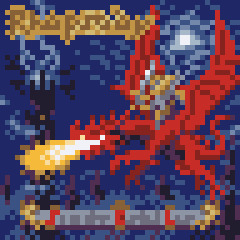
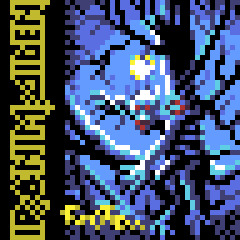
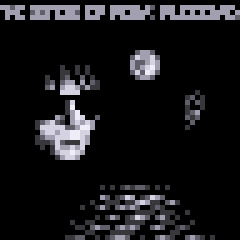
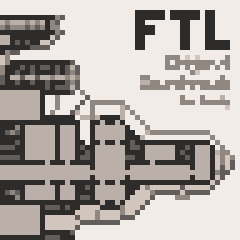
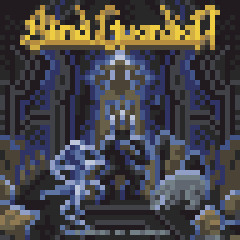
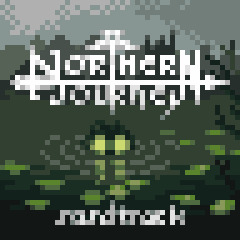



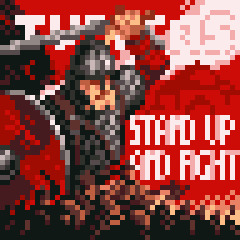

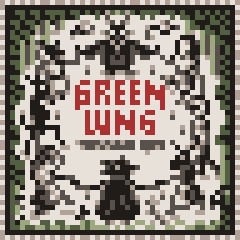
I may have gotten slightly addicted to the new Pixel Joint album collab
#pixel art#rhapsody#iron maiden#the sisters of mercy#FTL#Ben Prunty#blind guardian#Northern Journey#nightwish#patlabor#kenji kawai#morlocks#turisas#finntroll#green lung#art#art collab
67 notes
·
View notes
Text
#tumblr polls#signalis#warhammer 40k#warframe#system shock#FTL: Faster Than Light#FTL#alien#dead space#marathon#space horror
477 notes
·
View notes
Text
There are things that live in hyperspace. They're hard to find, because that realm is dark and starless, so most consider them nothing more then cryptid stories, but they're real. They don't just float either, there's entire ships out there, and space stations, mabye even planets.
They say whatever lives there is a dark mirror of what lives out here. In the part of space that has a civilization that upgrades their body with technology, hyperspace is filled with biomechanical horrors that assimilate technology and flesh alike. The areas of space inhabited by a race of psychics has a hivemind in hyperspace endlessly assimilating new beings into itself. In the part of space that has a race of honorable warriors, hyperspace has a race of brutal killers who lust for blood. And in the part of space that has wise ancient beings, hyperspace has eldrich horrors the likes of which no world has ever seen.
Nobody has seen what the dark mirror of humanity is. But we know the the areas around earth has the most hyperspace disappearances, and the most legends about horrors taking people in the night. Perhaps such a species is where ancient legends of faeries or ufos come from. The thing that mirrors the race that adapts, the race that spreads, the race that conquers.
#196#my thougts#worldbuilding#writing#my writing#my worldbuilding#spaceship#space exploration#scifi#sci fi#sci fi horror#scifi horror#space horror#horror#cosmic horror#eldrich horror#eldritch#eldrich#science fantasy#science fiction#original fiction#flash fiction#short story#short fiction#faeries#fae#cyborgs#humans are space orcs#hyperspace#ftl
182 notes
·
View notes
Text

Requested by @silence-at-the-library
#FTL Faster Than Light#FTL#faster than light#video games#gaming#video game polls#polls#tumblr polls#strategy#roguelike
40 notes
·
View notes
Text
None of our spaceships have floors like the cars on the Flintstones.
Some spacecraft already have gloveboxes for handling scientific experiments, but none of them have a place where pilots can slip their legs into sleeves that extend below the craft so they can run really fast while the craft moves forward.
It's going to be really embarrassing for humanity when we learn that every other spacefaring species figured out centuries ago that legs extending below the craft are essential for FTL travel.
377 notes
·
View notes
Note
KazaaakplethKilik from FTL?
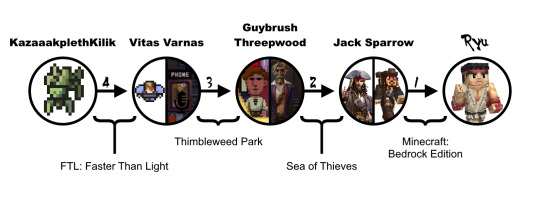
KazaaakplethKilik has* a Ryu Number of 5 4.
(CORRECTION: Per @skapokon, an update to Sea of Thieves that adds Monkey Island content shortens Kazaaak's Ryu Number.)
(old image and explanation below)

The one unambiguous crossover for FTL I could find is a Rockman assist character in Fraymakers, which as the "a" implies is never specified as a specific Rockman (like, say, Ariadne) and is therefore ineligible.
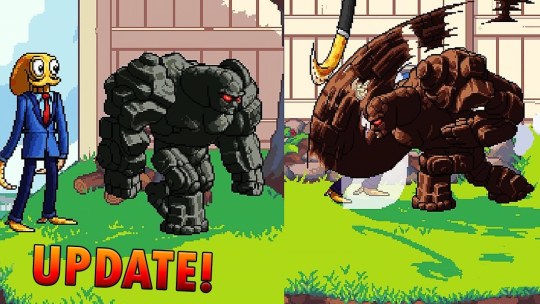
So lacking a more straightforward path, we're going to have to take a bit of an iffy detour through Australian actor, video game enthusiast, DidYouKnowGaming? collaborator, and noted Game Grumps fan Vitas Varnas.
If there's an indie game that had a fairly well-known crowdfunding campaign, especially with some substantial higher-tier backer rewards, there's a decent chance Varnas helped back it. Broken Age, The Banner Saga, Mighty No. 9, Shovel Knight, and Wasteland 2 are among the many games he's thanked in as a backer and can be spotted in some minor capacities. Naturally, one of them was FTL.
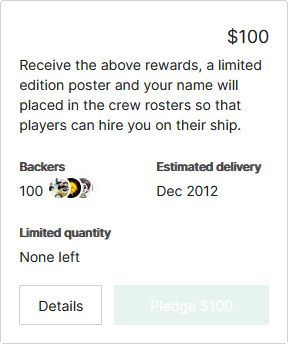
Through this backer reward, a random male human crewmember can be named "Vitas Varnas". You can absolutely quibble over whether it makes sense to count this as the same "character" as the real Vitas Varnas, but the restriction that the crewmember must be male and human in order to be named Vitas Varnas, combined with a general lack of default names for crewmembers (bar special ones like Kazaaak), is basically enough for me.
If you allow that, Varnas has also lent his voice to Thimbleweed Park as part of yet another backer reward.
youtube
As a Ron Gilbert joint, you can spot Guybrush in the background of a scene in Thimbleweed Park, and the rest is a known quantity, more or less.
168 notes
·
View notes
Text
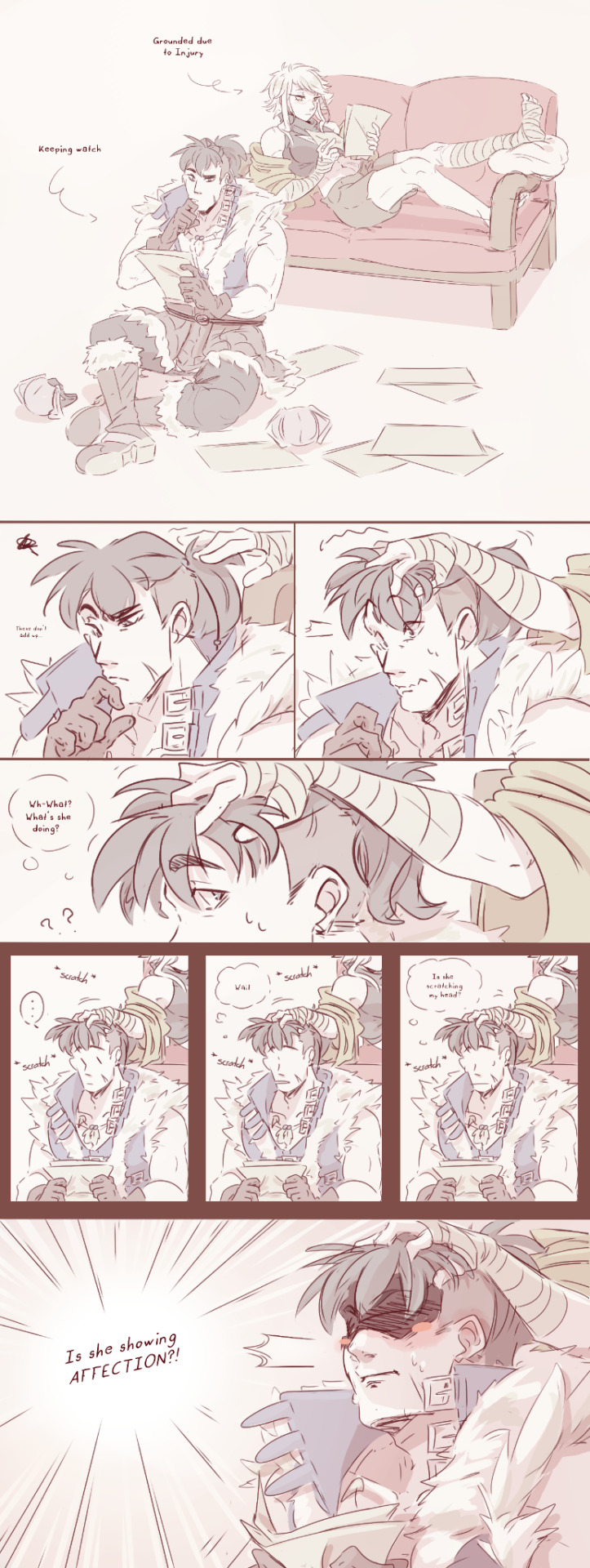


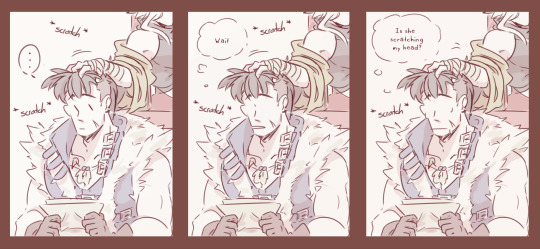
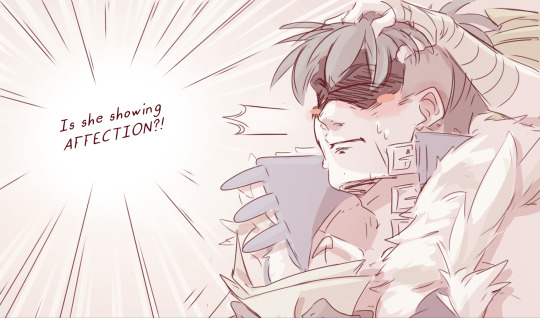
For some reason I keep forgetting to post this comic even though it's been finished for months by now xD Zet, FTL, Im so sorry 😭😂
ANYWAYS, super old comic by now but I cleaned this up for the MH questionnaire. Just the quiet ways Zet learns to show her affection.
327 notes
·
View notes
Text
♡ roman holiday | sunghoon ♡

will this bucket list trip be the thing that finally forces you to face your feelings? or will it be the thing that tears the two of you apart for good?
♡ sunghoon x gn!reader | wc. 9.4k ♡ genres/tropes: childhood friends to lovers and the fluff and angst that comes with it, college!au (not obvious but implied), road trips ♡ mentions of/warnings: arguments, references to a toxic family environment, allusions to drowning, i think that’s all but lmk if there’s smth else that needs added! ♡ a/n: this has been a wip for SOO long we’re talking YEARS and has changed muses several times but i finally sat down to finish this and im so proud of what i managed <3 truly some of my favorite things ive ever written ! inspired by roman holiday by halsey! this is also the longest thing i think i have ever written <3
♡ masterlist ♡

The coffee ring on the counter stares back at you, warm brown against a stark egg white. You can’t tell if it’s old or new, and part of you doesn’t care. Another part wants to know, though, when the coffee stain was made and why it was never cleaned. The motel is practically empty, the older lady behind the front desk and a tired-looking family in the corner of the dining room are the only other inhabitants.
Through the windows, dressed quaintly with homesewn drapes, you see the tall mountain trees, dark green and prickly, stretching up to the crystal blue sky. The television across the room is set to the weather station, and the anchor talks about how a cold front could potentially lead to an early snow.
A tray with various breakfast items clunks against the table, and the boy you’ve been traveling with settles in across from you, faux leather chair seat squeaking beneath in subtle “I’m hardly ever used” protest. His dark hair falls into his eyes messily, as if he only just now got up and rolled out of bed. The red flannel and vest he wears matches the surroundings, but looks absurd on your best friend.
“Sunghoon,” you start, interlacing your fingers and resting your chin on the bridge they form. Your eyes scan the tray, accounting each and every tiny portion of food. Eggs, both scrambled and hard boiled, some toast with an assortment of little jam containers, a little bowl of butter, two pancakes, half a waffle, and a few strips of bacon. “Thank you for getting everything,” you continue, leveling a stare over the top of your nose, “but you forgot the syrup.”
The boy in front of you blinks, bites his lips, and nods his head. A soft yeah, I forgot the syrup escapes his lips as he slides out of his chair, the pleather squeaking once again. “Give me like two minutes,” he says, “the breakfast bar is crazy to navigate. Do you see the things I do for you?” His smile is teasing.
“It’s no problem, Hoon—” Your voice trails off as he jogs off into the distance. You shake your head, feeling lethargic and sleepy beneath the slow-turning ceiling fan. Your gaze follows its metallic clink, and the fan seems as if it’s never been replaced in the 50-something years this establishment has operated.
You’re brought back down by a small tug on your sleeve, and when you look, it’s the little girl from the tired family across the room. She blinks up at you, not much unlike Sunghoon, innocent and full of curiosity. You nod your head, encouraging her to talk. The little girl takes a big gulp of air, dual pigtails bobbing, before, “I think your boyfriend is very nice and I like how he gets you your breakfast.”
The laugh that leaves you is easy, the statement hardly shocking at all. You’re used to it, strangers and acquaintances alike assuming the relationship status between the two of you. It’s nothing new. The little girl’s face is confused, her head listing to one side. You nod again, swallowing any additional laughter. “He’s not my boyfriend,” you reply, and you see a little bit of the light in her eyes diminish. “We’re just really good friends. He’s my best friend, actually.”
The girl’s brows furrowed together, a small pout forming on her lips. Obviously not the answer she was expecting. Then she nods, lips pursed. “Yeah, okay,” she mutters, seeming confused. Before she turns to walk back to her family, she looks back up and adds, “He’s a good friend. I would keep him as my friend for a long time.”
“That’s what I intend on doing, kiddo.” Your voice is quiet as the little girl skips back across the old, faded carpet towards her family. You see Sunghoon emerge from the breakfast bar, where everyone else at this motel must be. He waves small packets of syrup in the air. The smile that flits across your face is fleeting. You try to ignore, again, this feeling in your chest. Your voice is small, talking to yourself. “For as long as possible.”
***
The candy-colored Valentine stared back at you, practically mocking you. Third grade and only one Valentine. You tried to fight back the tears, attempted to sniff them back inside, but nothing worked. They fell, one by one, onto the homemade card, soaking through the pink construction paper and leaving roundly-shaped wet splotches across your only card.
You read the simple message, “Happy Valentine’s! – Sunghoon”, over and over and over again. You racked your brain, trying to figure out why, why, why no one else gave you a card. You were nice, you offered to help them when they needed it. It seemed like everyone liked you. They even let you sit by them at lunch.
So why?
The hand on your shoulder startled you, your head whipping up to face the figure standing beside the desk. It was Sunghoon, the boy who gave you the only Valentine in your possession. The edges of his dark hair curled around his eyebrows and the corners of his eyes. His brow scrunched with worry, and he ducked down to see your face.
“Are you okay?”
You shook your head, a bitter pout filling out your lips. “Does it look like I’m okay?”
Sunghoon shrugged, removing his hand to pull out the seat beside you. “I guess not.” He pursed his lips, hands clasped in his lap, before looking back at you. “What’s the matter?”
You flung the single Valentine—his own Valentine—back at him. The construction paper flew through the air before catching, floating down to land on the table by Sunghoon, who deftly picked it up and turned it over in his hands.
“It’s the only one you got?”
You nodded, crossing your arms on your desk and sinking into them. A heavy sigh left your chest and you sniffled, trying to keep the angry tears from falling again. You wished the day would end; that the bell would ring and release you so you could go home and cry somewhere comfier instead.
There was silence, then, “Does it matter if you only got one?”
You scoffed, still hidden in your arms. “Uh, duh? It means no one in this class likes me.”
“Then… why does it matter if everyone else doesn’t like you? Shouldn’t one person liking you be okay?”
You bit your lip. You can’t tell if you like his thinking or not. You decided not to respond.
You heard the chair scrape against the wood floor beside you, and you figured it was Sunghoon leaving to return to the other students. That was fine, you figured. It’s what you should expect, anyway. Even if he was the only one who gave you a Valentine, it was probably only because he gave the whole class Valentine’s. What a guy.
Then the chair was drug against the floor again, much closer this time. You popped your head up, a scowl still on your face, to see what was happening. Sunghoon had scooted it closer, and in his hands was another Valentine. You watched as he flipped the card over to the decorated side and skillfully pulled off the foam heart-shaped sticker, as if he’d had to do this thousands of times before.
His question is one you didn’t expect. “Where do you want to go?”
You look up at him, incredulous. “What do you mean?”
“Well, if you don’t have many friends here, you must want to be somewhere else?” Sunghoon shrugged, as if the thought made perfect sense to him. “Right?”
You pursed your lips, mimicking his shrug. “I guess you’re right...”
“Then,” Sunghoon began again, “where do you want to go?”
“Uhm, my house?” you answered. Crying on your fluffy bed would be much more comfortable than crying on this hard desk. Your arms were sore from resting on the edge and your back was stiff from the awkward angle.
Sunghoon shook his head. “No, think bigger. Like, vacation places and stuff.”
“Hmm... then, maybe, the big cities? The ones you always see in TV shows. And... the beach, because the ocean is really nice.”
Sunghoon nodded, diligently taking note of every place you suggested. His handwriting is a little crooked, but it fit on the now vacant front of a Valentine’s card. He looked up at you, eyes wide with question. “Anywhere else?”
You frowned, deep in thought. Then, as if someone tapped you on the shoulder and whispered it in your ear, an idea sprung to mind. “A really tall mountain, where it’s snowy all the time. No matter the season”
The pencil lead pulled across the paper, leaving information behind. Sunghoon returned to the top of the page, tapping the pencil’s eraser on the side of his cheek before scribbling a final note down. “There! It’s finished!” He slid it over in front of you.
You read the title of the list aloud: “The Wanderlist? But that isn’t even a word.”
Sunghoon shook his head. “It is now.” He leaned over, pointing at all the places you had stated. “And that’s everywhere we’re gonna go, because I’m your best friend now. We won’t be lonely, because we have each other. And we’re gonna travel all over.”
You sat up, leveling him a stare. “Well, this is gonna be expensive, you know. Trips aren’t free. They cost a lot.”
Sunghoon smiled, the kind that, even for a tin moment, makes everything seem like it’s possible. “Then we better start saving now!”
***
The pink paper stares up at you from its place on the dashboard, stuck with a random sticker right next to the air vent. The edges had aged, curling and warping, and your tear stains from 3rd grade are still faintly visible. You read over the list—your wanderlist, as Sunghoon had named it all those years ago.
1. Big cities (because TV) x2!!
2. The beach (because cool ocean)
3. Tall mountain (because always snow)
The big city had been marked off in 6th grade, when the class had a trip to the modern art museum, and again in 8th grade for a series of school-wide competitions, from writing and art to band to mathematics and science. Sunghoon had excelled at creative writing while you swept the math category for your region.
The beach was crossed off the day before the two of you left for college. How bitter it was that you had to be separated, together for ten years only to be settled in two different places. Yes, you weren’t that far away. A half day’s drive. But you both knew, deep down, how likely seeing each other was.
So you did something about it. The day before, you woke up before the sun. You loaded his car up with everything you would need for a daytrip, and you took off for the coast. You spent the whole day, afternoon, and evening parked at a spot on the beach. If you think about it now, you can still smell the seabreeze, imagine it in your hair. You can hear Sunghoon’s laugh, about what, you can’t remember. You do remember how happy you both were.
You remember sitting side by side, sharing a blanket over your shoulders as the seabreeze grew colder, watching the sun disappear on the horizon. You remember the thoughts you had–the ones you normally stamped down and annoyed. You should tell him. You’d been so close before. You wouldn’t even say the word to yourself, but you knew.
You didn’t say anything
“Can you believe these clouds?” Sunghoon says, slipping into the driver's seat and shutting the door. He places his keys into the ignition and turns like he always had. You watch the keychain you got him freshman year of high school swing from momentum. When you look back up, Sunghoon is watching you, leaning one elbow on the center console, hair in his eyes. “I suppose even the weather believes my sunny disposition is more than enough.”
“Oh, please,” you scoff, smacking his shoulder. You turn to look out the window, biting your lip. You’ve got to get it together. You blame that little girl from breakfast. You’d been doing just fine not thinking about Sunghoon in That Way. Now here you were, all these stupid feelings drummed up.
It doesn’t help that Sunghoon pulls out a cassette–MT-PSH-5–and pops it into the player. His smile grows wide as he turns out of the parking lot and onto the road, heading further up the mountain. “Nothing like some classic tunes.”
It was dumb. It didn’t mean anything.
It’s all you can think about.
Sneaking out late, hot summer heat still sticky and oppressing. You could feel the waves rise up from the concrete as it finally felt relief in the moonlight. You’d felt like dressing up, sneaking into your mother’s room and applying her fancy department store perfume to the nape of your neck. Your fingers gracefully found her pearls in the glass bowl on the dresser as you left, and you pulled them over your head, letting them rest against your collar bone. They’re still cool against your hot skin.
You escaped through the back patio, walking past the fist-sized hole in the drywall you wished you could forget about. The dusty edges kept raining down debris if someone walked too close to it. You let yourself out the gate in the fence, pulling it shut behind you. You felt for the keys to the front door in your pocket, and they jingled in response. You clasped your hand around the cool metal, the cuts sharp and edgy beneath your palm.
He met you at the corner of his street and yours, his dark hair swallowing up the soft moonlight. It made his features seem younger, softer. It felt like you were kids again.
You fell in line beside each other, walking the empty streets without fear. Who was to stop some teenagers walking the street at midnight? Random cars passed by, people finally returning home from the late shift but paying no mind to you two. And that was fine; you didn’t want them to care.
The black gates around the community pool glinted in the yellow streetlights, reaching out to you like a beacon. The closer you drew, the more the overwhelming scent of chlorine filled the air. You walked forward, hands in your jacket pockets, one wrapped tightly around your house keys. You took a deep, steadying breath. This was fine. You had this.
“Hey, [Y/N], do we really have to do this?”
You rolled your eyes, pulling your hands from your pockets and grabbing the top of the fence. You’d have to pull yourself up, and be extra careful of the metal pickets at the top. It’d be tough, but you could make it. “What?” you snapped back lightly, voice echoing amongst the night. “Scared of hopping the fence?”
“No, that’d be ridiculous,” Sunghoon replied, crossing his arms and shifting his weight to rest on one foot. “Jumping fences is nothing for me. Jumping fences into property that—” he pointed to a white and red sign just beside your knees. “—considers jumping fences into property after hours as illegal and trespassing? That sets me on edge.”
You sighed, rolling your eyes again. “It’s not like they’ve got police roaming around or anything, and the owner’s too cheap for security cameras. I’m sure if we tried hard enough, we could just pull the fence down instead of having to jump it.” For emphasis, you grabbed hold of the rods and shook. A loud metallic echo escaped into the night, and before you could pull back and shake a third time, Sunghoon had dashed to your side, placing his hands on yours to stop you.
His brown eyes caught the light as he shook his head back and forth and hissed, “If you’re going to do something illegal, do it quietly! Especially when I’m here.”
You leaned forward, head inching towards his, with a scowl on your face. “Then shut up and hop the fence.” You drew back, replacing your hands at the top and pulled yourself up and over with ease. Maybe mandatory PE did have benefits.. Your sneakers landed on the pavement, and when you stood upright from the landing, you stared at Sunghoon through the bars. “You can either join me,” you began, a smirk on your face, chin tilted up, “or you could just wait while I go and find my car keys.”
You turned on your heels, walking towards the lifeguard’s shack. You could have sworn the sigh you heard was strong enough to blow the fence down altogether
Your shoes scuffed against the concrete, and you felt the humid air of the pool spill over and try to reach out to you. Its arms clung and bit at your ankles as the water inside sloshed around with the teasing wind. You shook them off, changing course from the pool’s edge to the guard’s shack. The padlock on the door seemed old—really old—and you crossed your fingers before giving a giant tug and having it pop open in your hands.
The wooden door swung open and you stepped inside the dingy shack. Various lost pool toys littered the floor, and a box of deflated tricolor beach balls appeared to have seen better days. But you weren’t interested in any of that: you needed your car keys. Above you, nestled nearly at the top of the peaked roof was a loft filled with white plastic bins. One of them, you noted, was closer to the edge than the others, as if someone had lazily swung it up there.
You crossed your fingers again, reaching up to pull the basket down to you. “Please be there, please be there, please be there,” you chanted under your breath. You peered into the basket. On top, someone’s embroidered handkerchief. You pinched the soft material between your finger and thumb before tossing it aside in the basket. Someone’s crazy straw, two Rubik’s Cubes, a school ID lanyard, and—yes!
You fished your car keys out with one hand and swung the basket back up into the loft with the other. You turned to leave, ready to find Sunghoon, reunite with your car, and drive home, but before you can even take a single step back out you’ve run into something.
Or someone.
Your scream’s instantly shushed by your best friend, a single finger coming up against your lips. Sunghoon was so close, and you felt the pool humidity roll off his shoulders as he looked at you with confusion. “Are you done?” he asked. “And why are you screaming?”
You shook your head, holding up your keys. “Yes. Also, you scared me. How did you get in here? I didn’t think you’d hop the fence.”
“Didn’t have to.” Sunghoon held up a matching padlock to the one you’d pulled off outside. “Looks like the owner’s too cheap to buy actual locks for his gates. I simply walked in.”
You left the lifeguard’s shack, replacing the lock and headed for the entrance, where Sunghoon easily swung open the wrought iron gate. You walked towards your car as Sunghoon redid the lock, simply looping it through and clicking it shut.
You kissed your car keys and unlocked the doors, swinging down into the driver’s seat. Sunghoon slid into the passenger seat beside you, and as soon as his door shut, the engine was starting and you were pulling out of the parking spot.
“Let a guy put on his seatbelt first?” Sunghoon joked as he clicked his into place. “I don’t see you wearing yours, [Y/N].”
“Then you’re not looking close enough,” you replied, taking one hand off the wheel to pull at your own seatbelt. “Seems as if someone isn’t paying attention.”
“Forgive me, I was busy making sure no one saw our illegal activity. I would like to graduate high school next year with a clean record.”
You laughed something similar to a scoff as you flicked on your turn signal and made your way down his street. “You say that as if we robbed a bank. Is it really trespassing if the locks don’t even work? The wind could have undone them.” You turned to catch a glance at your friend, and what you caught was a judgmental glare in the green glow of the dashboard.
With a simple curve of the steering wheel, you pulled in front of his house. You shifted the car in park and rotated towards the passenger seat. “Thanks for breaking the law with me, Sunghoon. It means a lot. I’m touched.”
“Yeah, yeah, sure,” he muttered, running a hand through his hair. He leaned towards the door, making as if to pull the handle and open it, when he reached inside his pocket. His eyes lit up and he turned back towards you. “Oh, yeah!”
You shook your head, confused. You hold a single hand up. “Oh, yeah, what?”
“Here’s that mixtape you wanted,” Sunghoon answers, placing a cassette tape in your unintentionally outstretched hand. You scowled. You didn’t know how he had the technology to make a cassette in this day and age, but then again, you were the one with a car so old it still had a cassette player. You two were a pair, you supposed.
“When did you finish it?” you asked, spinning it around in your hands. The clear, Sharpie handwriting read MT-PSH-5 on the short white label.
“This morning,” he replied, fiddling with the hem of his shirt.
“Why didn’t you give it to me earlier, then?” You turn to look at him. The yellow glow of the streetlights blend in with the green of the dashboard lights. His eyes remained that entrancing brown color, though. Romantic and homey all at once, untouchable by any other shade.
Sunghoon shrugged. “Perhaps it was because you didn’t have a car to play it in when I finished it? It was unavailable to you, shall we say.”
“Ha, ha, very funny.” You kept turning the cassette in your hands, as if you’d find something new and exciting on each turn.
“Oh, and—” Sunghoon leaned across the center console, reaching to take the tape from your hands, like he had something to say or show you. But he stopped. His brows furrowed together, and he turned to you, face mere inches from your own. “Are you wearing perfume?”
You nodded. “Yeah. My mom’s, and I got mad at her since she got mad at me about the car so I...”
An eyebrow quirked up. “You’re showing your mom up by stealing some of her perfume?”
“It’s expensive,” you muttered, sliding down into your seat. “She’ll have to pay for it later. Literally.”
And with that, he laughed. Nice and hearty and his eyes turned into tiny crescent moons and you felt your heart flutter—something that had happened a lot as of late, and you’re not entirely sure why. Yes, Sunghoon was a good friend. A best friend. But that’s all he was. He—
“Hey.” Your attention snapped from a distance spot on the road over to him, and he felt even closer now for some reason. Your heart registered how soft he’d spoken and proceeded to beat faster because of it. His eyes searched yours, but for what you don’t know. When he spoke again, his voice was quiet. “Make sure you get home safe, okay? Wouldn’t want anything happening to the city’s greatest delinquent.”
“Yeah,” you laughed, but it was short and stilted. You barely heard what he said over the thumping of your own blood in your ears. You felt the red flush creep up your neck, dusting your cheeks and turning your ears a cherry color. When you swallowed, your mouth suddenly dry, all you could think about was how loud it seemed. Your grip on the mixtape tightened, it seemingly the only thing tethering you to the real world.
You couldn’t tell if the radio was one or not or whether you’d turned car off and left the keys in the ignition. All you could tell was Sunghoon, so close and so real he almost seemed unreal. And then it happened. He leaned in, eyes fluttering shut before placing a soft kiss on the side of your cheek, right next to your lips. It happened too fast and it was the slowest moment of your life all at once. Your heart was practically screaming now, hands rattling around the mixtape.
When he pulled back, he kept going, opening the car door and stepping out. Before closing it, he leaned in and nodded. “I meant what I said about getting back safely. Promise?”
You nodded. “I promise.” You were surprised your voice worked at all. That you were able to form a coherent, albeit a simplistic, sentence. That you could think at all. The door swung shut and you shifted the car into drive.
The whole way home felt automatic, limbs working separate from your internal instructions. When you returned home, you pulled up beside your mailbox and turned the car off, pulling the keys and letting them rest in your hand. You sat motionless, seatbelt still in place, as you stared, eyes fixated at someone mindless spot on the dashboard. The pearls were cool against your heated skin.
It was dumb. It didn’t mean anything.
It’s all you can think about.
You flip the mixtape over in your hands, reading the slightly-faded yet still legible handwriting. MT-HVC-5. You’d run through the songs already, and Sunghoon had switched to some CD mixes he had brought. Why he didn’t get a car with Bluetooth, something you’d done a while ago, you’d never know. Maybe that was part of his charm.
You’d managed to learn to forget about that kiss, or at least ignore it. But Sunghoon pulling out the mixtape he’d given you that night pulls it back up to the surface. You aren’t even sure how it even got into his possession. The longer you recall the memory, the more you can feel the burn on your cheek from where his warm lips touched your skin. The rest of the flush comes back from how you wish so badly it would happen again.
“What’s up?”
“Huh?” You turn towards his voice, away from the window.
“I asked what’s up,” Sunghoon repeats, looking over at you for a split second before returning to the road. “You seem like we’re on another planet.”
“Just thinking about when we were younger, you know...” Did he? What did you want him to think about? The day you’ve been obsessing over? And then what would he do about it? Pull over and confess? Kiss you, but mean it this time?
Sunghoon laughs, breaking your thoughts. He spares another quick glance in your direction. “Younger like what? Like third grade or two days ago?”
You reach across the center console to smack his shoulder. “Why would it be two days ago?”
“We were younger then. Wild, foolish.” Sunghoon takes one hand off the wheel and places his knuckles on his forehead. “The way we were is actually unimaginable now.”
“I’m done with you.”
Sunghoon scoffs. “Sure you are.” A quick beat, a hum to the music. “Anyway, what were you thinking about?”
You’re quiet for a moment. Then, “Do you think we'll change?”
“We have changed.”
“Really?” He said it so simply, it takes you off guard. You turn to look at him, even though you know he’ll keep his eyes glued safely to the road.
“Yeah,” he shrugs. “We’ve totally changed. We don't like the same kinds of music as the old us used to. We don't eat mac and cheese for every conceivable meal—except for the day after that one chem exam.”
“That final was hard!” You reach across the center console to shove at his shoulder–oh, god, why do you keep finding ways to put your hands on him?–earning a smug grin. “None of it was covered in class and you know it!”
“See what I mean?” Sunghoon asks. “We're different, but like, a good different. We’ve adapted.”
The silence that fills the car after isn’t weighty or overbearing. It’s comfortable and common, safe like a child-loved security blanket. Yet, somehow, your stomach fills with stones of dread, and all you want to do is sleep off any bad feelings.
You keep your eyes trained ahead, the curving mountain road, when you ask, “Do you ever think we'll be bad different?
Sunghoon spares a confused glance at you, brows knit together as he switches focus between you and the road. He shakes his head. “No, not us. Never us.”
“Is that a promise?”
The hand closest to you leaves the steering wheel and drifts over the center console, pinky out. “Always.”
You wrap your pinky around his, and try to ignore the heated flush you feel creeping up your neck and the backs of your ears. You focus, instead, on how real Sunghoon feels. How solid the mixtape is in your hands. How, here out in what feels like the middle of nowhere surrounded by evergreens and roadside snow piles that have started to pop up and tall mountain views, time doesn’t feel like it can get you.
Maybe he’s right.
Maybe, out here, there’s only good different.
Maybe, that’s all you need.
The clouds from the morning have turned darker, more potent. You can smell rain in the air, hear it as the wind rushes through the trees. It’s so cold though, you wonder if it will snow instead. The mountain weather you’d been looking forward to for so long.
Sunghoon knocks his shoulder into yours, cheeks pink from the cold. He swings your duffle bag towards you, letting go of the strap before you’ve gotten a good grip on it. “Your luggage,” he declares, before marching towards the hotel entrance.
You’d both decided, with your combined measly college student incomes, that wherever the last hotel would be, it needed to be the best you could afford. Standing in front of it now, styled like a fancy chateau with white walls and a red roof, you think the two of you made the right choice.
You had forgot what made such a nice place so affordable, until Sunghoon swipes the key, opens the door for you, gesturing for you to walk in first. The room is cute and delicate, with pretty yet aged wainscotting, petite floral wallpaper, a nice view of the surrounding mountains and–
And one bed.
You freeze. You can’t help it. Maybe the you from this morning, before that girl talked to you, could handle this. The you of right now? The lady at the front desk calling you a cute couple, and Sunghoon going along with it and not correcting her, didn’t help. You aren’t sure if you’re strong enough to keep everything the same.
“Rats,” Sunghoon says, and you breathe a sigh of relief. He’s not cool with this either, you think. He turns toward you with a coy smile. “I’m gonna go back downstairs and ask for more pillows. Three simply won’t cut it. Want me to ask for some fancy water?”
You shake your head, voice gone, and you don’t move until you hear the door shut behind Sunghoon.
And that’s when it starts, as you drag your feet in circles trying to think your way through this. Your hands clench and unclench, fists forming so tightly you leave half-moons from your nails in the fleshy part of your palm. Your breath comes ragged and shallow, and you feel like drowning, except from too much instead of not enough. Too many memories reminding you of too many things. Too many emotions leading to too many feelings you neither want to recognize or acknowledge.
But one keeps pushing its way to the forefront, demanding attention and definition. The one that’s been bothering you all day. It makes you dizzy, to the point you feel you need to lay down and clutch at your stomach. Maybe that’s it, you think as you sit on the edge of the one bed. You’re just sick. Breakfast was bad. But you know it’s not. It makes you angry, because how dare you feel this way about him. It makes you flustered, since you shouldn't look at your best friend's face and have your gaze wander to his lips and wonder what they'd feel like against yours.
It makes you happy, so undeniably happy that you feel like crying, because it feels so right. When you allow yourself to think more about it, and imagine what life would be like if you were able to confirm and agree with all the strangers who already think you’re dating. Lovers. It fills you up with breaths of fresh air to the point it's like floating on cotton clouds.
It makes you fearful. Its dark side claws at your heart, threatening to tear at the tender seams and leave you bloody and raw, so intensely damaged you're afraid of doing anything along the same lines. You had asked about a bad different, and Sunghoon said it wasn’t possible. Right now, you feel like you have to disagree–confessing this? Altering the relationship you’ve carefully crafted for so long?
That would be a bad different.
That’s why, when Sunghoon comes back, three more pillows and a bottle of sparkling water, you don’t answer. You roll over on the bed, curling up away from him, hiding with a pillow on your head. You hear Sunghoon say something about it being a long drive, and he gets it, you should rest. You hear him open the closet door, then feel the spare blanket get draped over you.
And, as you lay here, hot silent tears threatening to spill over and run down your cheeks, you let yourself think about it. You're in love with your best friend. Your nail-bitten palms come to swipe at your eyes, you make the mistake of sniffing aloud. Sunghoon calls your name, and you hate how much you savor the worry in his voice.
But, it’s also too much. He can’t know, you decide. Not now, not ever. That is what would be best, you decide, for the two of you. To be able to get through the rest of this trip.
“[Y/N], what is it?” he calls again. Sunghoon’s voice is laced with care, something tender and soft and so distinctly him it pulls at the tears in your eyes. How can he make this so unfair? “What's wrong?”
“You wouldn't understand,” you snap, pulling yourself to sit up, the pillow falling off. You don’t look at him, but instead at your hands, fists in your lap. Sunghoon easily notes your posture, and confusion floods his features. You hate how quickly he can figure out something’s wrong, that something is bothering you.
“Can I try to understand, at least?” You look up at him, lips pursed, tears smarting your eyes. You take him in–turned towards you in the chair, sitting on the edge, like he can jump to your rescue at any time. The confused look in his eyes hurts—you've always been straightforward with one another. But you know you can’t about this. “I can’t try to fix it if you don’t tell me what’s wrong.”
You shake your head, wiping one of your cheeks with your fingers, a half laugh falling from your lips. “No, Hoon it's—”
“No.”
The force of the single word hits you, and it hurts more than the angry look in his eye.
He stands, takes a step toward you, then sits hesitantly on the edge of the bed. He's close, and he's been closer, but it's still too much. The rushing sound is back in your ears and your heart pounds against your ribs, telling you to do something, anything, but you stay still.
“Hoon—”
“I said no, [Y/N].” Sunghoon’s words are ice, colder than the breeze outside and sharper than butcher knives. His eyes, once warm and homey, that romantic shade of brown you love, are now dark and piercing. “You don't get to call me special names when you aren't telling me what's wrong. When you aren't acting like the [Y/N] I've known since third grade.” His hands come up to run through his hair, and it flips slowly back into place. His voice drops, the softer, confused Sunghoon returning. “You've been acting weird this whole trip, and especially since this morning. It's driving me insane that I can't figure it out and fix it. I know you better than this.”
He's so close, so, so close. Much too close. Somehow he’s scooted towards you on the bed. You can smell his cologne—when did he start doing that? Why hadn’t you noticed earlier? His eyes are back to the romantic brown, the warm and homey color, the ones that remind you of so many good memories—his eyes are so pretty. Your gaze follows its past patterns and drops to his lips, redder from being gnawed on with worry. A kiss would—
A shaky breath leaves you, and you're talking before you realize, voice so small it's hard to hear. But Sunghoon is listening. He always does.
You blink. “Do you want to know what's wrong?”
“Of course. I need to know if I can do anything or—”
“It's you.”
You want to be upset, angry. How dare it come to this. But you can’t, you realize. You can’t be angry at him. Whatever energy you had coursing through your veins leaves after your pseudo confession, and you turn away, resting your weight on the headboard, hoping he’ll go away.
This, for certain, was bad different. You can feel it, weighing you down. Here, in a chilly, single bed hotel room, you’d ruined everything. Your brain told you to shut up, to be quiet, to try and save anything you could manage from this shattering relationship. But your mouth—or maybe your heart—kept going, and going, and going.
“It’s you,” you repeat, turning back towards him. He’s still there, frozen in place, face filled with concern. “It’s everything you do. The way you... you tell me bad jokes when I’m upset over a grade or make me mixtapes because you want to share your music with me. It’s–I’m–I’m sick of it. I hate it. I hate you”
Sunghoon recoils, eyes wide. He looks around the room, as if the answers to what to say are hidden around. He stands, backing up without turning away, like you’re something he has to keep his eyes on or he’ll get hurt again.
Again.
Sunghoon’s voice is flat when he speaks, like he’s out of breath. Shaky, like he’s about to cry, too. What have you done? “I’m… I’ll go downstairs and ask about if there’s anything nice around for dinner. I’ll–I’ll wait for you in the lobby. Whenever you’re ready, you know.”
Even now, after the nasty things–after I hate you left your lips–he’s still trying to make peace with you.
What did you do to ever deserve him?
And would he even stay with you once you return home?
The door falling shut is what starts your tears again. You slump down off the bed, between it and the window. You pull your knees up to your chest, put your head in your hands, and you cry.
***
It still isn’t over.
You’re breathing heavy, tears still stinging your eyes, but you aren’t sure if you’ve actually cried yet or not. Your fists are balled at your sides. Years of friendship are stuck in your throat, enough to make you want to scream or cry or vomit from the nauseous feeling it induces. The pouring rain, those clouds finally opening up, doesn’t help.
Dinner had been awful, awkward. The only person either of you talked to had been the waiter. You can’t remember what the food tasted like. You can’t remember what, if any, songs played on the radio on the way back. Sunghoon hadn’t bothered to pick anything out. All you could remember, or hear, or see in your head–I hate you. The look in his eyes. How he has barely looked at you since.
You aren’t sure what you have to do to get away, but you’d be willing to make a deal.
Anything to get away from this moment.
Anything to get away from your best friend.
Sunghoon stares at you like he’s only just now met you, and maybe he has. He’d stopped you halfway between the car and the hotel’s entrance, despite the rain. He’d called your name in such a way you froze. Your angered confession from earlier hangs in the air, untouched or acknowledged. A single parking lot light illuminates you two, dim yellow casting shadows through the rain.
“Do you mean that? What you said?” he asks, daring to step forward. You don’t move, anchored in place. By fear or something else, you aren’t sure. He takes another, then a third. The gap between you has been halved. “I know you don’t mean it. I’ve been thinking about it this whole time. You don’t mean it.”
“What makes you so sure?” you spit, taking a step closer in your upset. You level Sunghoon with a stare you hope is intimidating, bitter. You hope he sees the duress. You have to push him away. “I said what I said. I hate you, Park Sunghoon.”
The boy shakes his head, hair stuck to his forehead from the rain. He seems almost incredulous, and it angers you even more. Why doesn’t he get it? There’s a small smirk at the corners of his lips, but you’ve known him long enough to recognize it as mock confidence. “You didn’t mean what you said.”
“I did!” Another step, and now you’re nose to nose with him, staring into the eyes you’ve had memorized for so long, that romantic brown even in the rain and yellow streetlight. Your gaze betrays you and you drink in the slope of his nose, see how his eyes examine you as well. Note the downturn of his lips, almost unnoticeable. Your voice is weaker when you speak again. “I did mean it, Sunghoon.”
He leans in, closer and closer until he stops–a breath away from your lips. He freezes, closes his eyes, and waits.
And you cave, despite your best interests. You find yourself tilting your head and wishing he’d do something more. This can’t be how your first kiss with Sunghoon goes? When he pulls back, and you nearly stumble forward. You look up at him, and the smile on his face is no longer mock. You know what his question will be before he says it, and you know he’s caught you in your lie. “You hate me so much–why did you kiss me back?”
You want to spit back, I didn’t! You want to argue. But the truth is, ever since you’d remembered that day in high school, you’d been imagining what it would be like to actually kiss him, and again, and again. You wanted to know what kissing Sunghoon would be like, even if it meant redefining the relationship you worked so hard to keep as is. The one you said you hated him to protect.
Sunghoon gently cups the sides of your face, forcing you to look at him, and you see worry and concern etched into the space between his brows, spilt in the color of his eyes. “Tell me,” he whispers, voice almost breaking, “what’s wrong. Let me try to fix it.”
You shake your head, trying to form words to explain everything, but all you do is shiver drastically beneath his touch. You watch as Sunghoon’s eyes grow wide, and he leads you inside, arm over your shoulder. The woman at the front desks awards you a quirked eyebrow, but that’s all you get before she returns to her clipboard.
The room is icy cold when you return, but Sunghoon adjusts the temperature in silence. “You get dry first,” he says, pointing at the bathroom. “Take a shower and get warm.”
“But about you?” You want to point out the subtle shake in his hands, and the way his breath catches. “There’s not enough towels to share.”
“I’ll ask for more at the front desk. I’ll be fine. Go.”
The shower water never feels hot enough, but you do stop shivering. You do your best to towel dry your hair. When you peek the door open to see if he’s back, and if you could get your things, you see that Sunghoon has already done it for you. Everything you could need taken from your bag, folded and placed nicely right outside the door. You have no idea when he did it–you’re thankful he did.
When he comes back with extra towels–which, surely, did not take this long–you’re curled up on the bed, similar to before. You rest your weight on the headboard, looking out the window at how the rain patters against the glass. You wish you could see the stars.
Sunghoon is fast, but who’s to say? You aren’t exactly keeping track of time. You know he’s back because you feel the mattress shift. His voice is almost silent when he speaks. “Can we talk?”
“About what?” you ask, turning towards him. You haven’t seen Sunghoon look this tired in a while. And you know it’s your fault. “How I was mean to you?”
Sunghoon smiles, looking down at his clasped hands. He takes a moment to determine what he actually wants to say. “Let’s start with…what it is about me that made you say that?”
His eyes are pleading in the dark. The room is barely lit, the overhead light off. There’s just a lamp on the desk and the streetlight from outside. The rain sound is almost overwhelming in the silence. “If there’s something I’ve done that hurt you–”
“It’s not that. It’s–” You pause, trying to find the right thing to say. You decide to start with the obvious. “There’s a reason I kissed you outside.”
Sunghoon rolls his eyes. “Yeah, because I’m charming and irresistible.”
“This is serious!” You do what you always do when he makes some kind of quip–you reach out to push his shoulder, scooting closer, but Sunghoon catches you by your wrist.
“I am serious. Do you know how much you hurt me when you said you hated me?” He levels you a stare, one that makes you want to shrink away, but you can’t. “When I left, I didn’t ask the front desk about restaurants. I went to my car and sat down and cried because the person I love just said they hated me.”
“You love me?”
“Not like that,” he corrects, and now you have to know what he means.
“Tell me how then.” You take your free hand and grab his other wrist, a mirror of what he’s done to you. “When you say you love me, what do you mean?”
“It’s not like you think, not like what it has been.” Sunghoon looks down, takes a deep breath, then carries on. “Not like friends, or like siblings, but like–”
“Lovers?” you offer.
Sunghoon swallows, sets his jaw. Then, “Yes. Like that. And I don’t know when it happened. I don’t know if it was overnight or gradual or all at once. I do know that I woke up one morning and I realized that I didn’t want to imagine my future with anyone else. And I didn’t want to see you with anyone else, either.”
“Kinda selfish,” you say.
Sunghoon laughs. “Yeah. I couldn’t help it.”
Somehow, you’ve both moved closer to each other. The knees of your crossed legs knock into each other. You still have a hold on the other’s wrist. Sunghoon levels you another stare. “Will you tell me why?”
“Why I said I hated you?” He nods, and you take a deep sigh. “Do you remember the night we snuck into the pool to get my car keys back?”
He nods again, a small smile on his face. “You mean the first night I got enough courage to kiss you? You looked so pretty, with the pearls and the perfume.”
You blush, hearing Sunghoon talk about you like that. “That night. I’ve been thinking a lot about it. And you know how all these people always say we look like a couple or whatever. And it all just stuck together and made me realize that I haven’t seen you like a friend in a long time. I’ve seen you like–”
“A lover?” Sunghoon offers, copying you from earlier.
You smile. “I said I hated you because I was afraid and overwhelmed, and I need you away from me. I thought that if you hated me, I could get over you and just move on. We could make up, and I wouldn’t have these feelings anymore, and we could go back to being friends.
“But if I’m being honest,” you add, moving even closer. Your shoulders knock into one other. “Even though it wasn’t even that long, those hours over dinner just now were some of the worst things I have ever had to do. I was ugly to you, Sunghoon, and you’re the last person on earth who would ever deserve to be talked to that way. But if you could forgive me, I…”
You try to look down again, but Sunghoon lets go of your wrist to place a finger under your chin, tipping your head up to his gaze. “You what?”
“I love you. I’m in love with you, I’ve been in love with you. I love you, Park Sunghoon.” You take a deep breath, just as lightning strikes somewhere far away and the thunder rumbles through the room.
Sunghoon reaches out for you, his hands reach cupping your face again. It’s the most reverent you’ve ever seen him. His eyes roam over your every feature, as if you’ll break if he breathes too hard. It’s thrilling. “Genuinely?” he asks, voice fragile. “You love me?”
“Yes,” you whisper. It feels wrong to be too loud right now, like someone else could join in this moment between the two of you. “And if you would have me, I’d like to love you for a long time after this.”
Sunghoon pulls you to him, resting your forehead against his. He takes a deep breath. Then, “We’ve both just been really, really stupid about it, haven’t we?”
You laugh, savoring his touch and his warm and his smile. You stare into his eyes, those romantic brown ones you love so much. “I guess so.”
“Can I kiss you?” he asks, and your heart jumps. “I know we did outside, but that’s a terrible story for a first kiss.”
“And the one from so long ago doesn’t count, because you just gave me a kiss then,” you say, not sure why you’re rambling when you have the opportunity to just kiss him already.
So, you shut up, and you do.
This kiss is reverent, unlike any that came before. You probably shouldn’t even bother comparing them. Maybe it’s the intentions behind the kiss—that you both want to be here, doing this, for the sake of just being, not proving. Maybe it’s because it hasn’t followed any dramatic late night outings or arguments. Maybe, it’s how you shiver closer to his frame, hands on his shoulders, and his own find the small of your back. You feel his smile against your lips, and the butterflies against your ribs.
Maybe, you should have said something a while ago. You could have avoided the whole I hate you stint, but then would anything else have been dramatic? Some couples are like puzzle pieces, perfectly fitting together with no stress. And maybe you two are a puzzle, one that fits together with ease, but you both intentionally hid pieces from the other, making it difficult to complete. Maybe airing grievances is the only way to get all the pieces back on the table.
You sigh as Sunghoon’s lips travel from your own down the line of your jaw, tickling in a delightful way. You feel safe in his arms, a safe you’ve always felt, but now it feels like something more, something even greater. Your heart jumps, and you throw your arms around his neck, pulling him close. Sunghoon instinctively holds you tighter, his hands against your shoulder blades.
“What is it?” he asks.
You shake your head, finding any words to be incredibly difficult. “I’m just—I’m glad.”
Sunghoon pulls back gently, quirking his head to one side as he looks at you. He uses the pad of his thumb to gently wipe away a stray tear. “Glad for what?” he asks, still cupping your cheek.
You lean into his touch, feeling dizzy with excitement and relief. “Glad that it’s you,” you say, your voice quiet. You lean in, placing a chaste kiss against his lips and, for once, he’s the one to shiver. “I’m glad you’re the one I love. Glad we’re here now, finally.”
Sunghoon pauses. His eyes dart between yours, your lips, and back. He rests his forehead on yours again, and you can already imagine getting used to this, and craving it when you can’t have it. “I waited so long, and I didn’t even know if...” There’s a catch in his voice, and he sounds like he’s about to cry. When he opens his eyes, there’s an honesty to them, a gaze you’ve only seen in Sunghoon’s eyes a handful of times. He smiles, his eyes going soft once more, like you are the most beautiful thing he has ever beheld. And to him, you are. “I always knew we were meant to be.”
***
The lady behind the desk did, in fact, look at you two like you were crazy. The night before you were acting like you were gonna tear each other to pieces. But now you’re walking out in each other’s arms? His around your shoulder, yours around his waist?
The sun is out, and there’s hardly any evidence of the downpour from last night. Maybe the earth needed to be just as dramatic as the two of you.
With the luggage in back, you two climb into the front seats. Sunghoon leans over the center console to press a kiss to your temple, just like he did when you woke up in each other’s arms and just like he did when he insisted on getting you whatever you wanted for breakfast.
“That’s not something new though?” you laugh, as he brings you small portions of everything the hotel had to offer. “You did this before.”
“Well, it’s obviously different now,” he replies. “I didn’t get to kiss you before.”
Now, Sunghoon taps at the Valentine heart on the dash–your wanderlist. What started this all. “We need a new one,” he says. “It took us a while, but we did everything on here. Should the new one be full of cringey couple things?”
“Only if you’d like to go back to being single.”
Sunghoon fakes shock as he shifts the car into gear. “You wouldn’t.”
This time, you lean over to give him a kiss, and you relish how quickly he blushes. “You’re right, I wouldn’t.” You sit back down, still turned towards him, hand atop his. “Maybe, we make the list up as we go. I mean, we’ve never been here before.”
“Didn’t stop third grade us,” he says. “Honestly, they seemed like they had everything together. We should think more like third grade us.”
“You mean complaining about how much things cost? Because I can think of so many things we could do together that would put major dents in our wallets.”
Sunghoon turns to you, a mischievous twinkle in his eye, and you know you’ve got this right, even if it took a while to get here. He reaches over, poking your cheek, before turning out of the parking lot. “Then let’s go find it, together.”
#kdiarynet#kwritersworld#kflixnet#k-labels#enhypen fluff#enhypen headcanons#enhypen scenarioes#enhypen imagines#sunghoon fluff#sunghoon headcanons#sunghoon scenarioes#sunghoon imagines#enhypen#fluff#angst#college!au#ftl
157 notes
·
View notes
Text
People don't realize how lonely it is to be part of an interstellar civilization. Space is massive, most people just think there's a lot of things in it, and there are, but there's way more nothing than there are things. Millions of worlds have sentient life, but in a galaxy the size of the milky way millions is actually a very small number. Sure there might be countess sentient spices but you're not close to any of them.
Ftl makes things better, but it's not like things are much better in hyperspace. You always end up having to take weird routes because there are some parts where nothing can exist. And in the parts where matter can exist, you aren't alone. People should remember that hyperspace is also where things like the fae live, and there's a reason humans developed instincts like the uncanny valley just to avoid thing, even if some of them are nice.
Than in standard space most of it is just empty. If you don't live in one of the few built up systems like Sol or Razah or Tetumon, you're mostly exploring pretty empty space. There's just way more systems and planets than any humanoid race is going to want to colonize. Most planets are empty, of either all life or sentient life, and most sentient things you find are more likely to be completely alien entities, like cosmic whales, or angel outposts, or machine colonies, or dark towers. Just there mysterious things humanoids can't really dead with well.
It's weird, when you do find humanoids outside of the few built up systems it's always weirdly freindly. In a homeworld of an advanced species like earth, two nations on the same planet might go to war. But when you're out there on your own, and you see a few other people of any humanoid race, you're going to greet them as freinds and fellow travelers.
And of course, the few inhabited places out in the dark parts of space always will seem like beacons of light. Most colonized planets outside a major system are really just one or two cities and their satellite towns, because there's not enough people to create anything else out there, but those cities always do feel like these oases of civilization, and places where any humanoid race or civilization will be welcome, even if out of necessity. They also tend to be a lot more politically idenpented from their founding nations, as well as giving a lot more rights to their citizens, because they need to to stay alive, and they're far easier to overthrow. The same goes for the spaceports, especially the city sized ones you'll see along trade routes, light-years from any system.
To find one is to find a small peice of the world that has other people, where you can eat, and talk to people, and listen to music. For those who are born there they are in small worlds, surrounded by darkness. And there are also those who flee there, those lone cities tend to be a lot more tolerant, and a lot more meritocratic than the great terrestrial empires. There are some who lead there, and whose ideas are accepted there who would never lead in terrestrial empire. And there are those who go to them for they have nowhere else to go, those who wouldn't be tolerated in the towns and suburbs of the terrestrial empires, who live in those space stations and lonely cities, knowing the rest of the universe is dark for them.
#196#worldbuilding#writing#my worldbuilding#my writing#space travel#space exploration#spaceship#space#sci fi and fantasy#scifi#science fantasy#science fiction#sci fi#eldrich#eldritch#cosmic wonders#cosmic bliss#ftl#original fiction#short story#short fiction#flash fiction#scifi writing#scifi worldbuilding#sci fi writing#sci fi worldbuilding#science fiction writing#aliens#alien
71 notes
·
View notes
Text

leipzig 2024
21 notes
·
View notes
Text
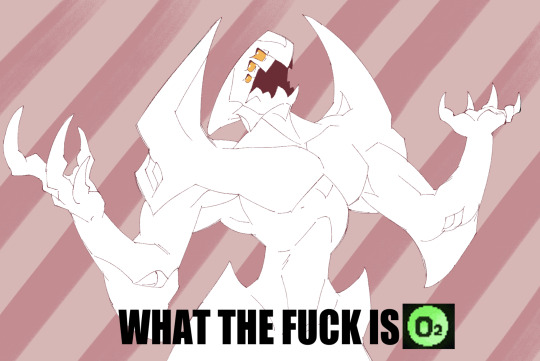
do you remember FTL?
233 notes
·
View notes
Text




Ruwen
#ftl#faster than light#scifi#doodle#aliens#spoilers I guess#I hope these vignettes make you want to play this obscure 13 year old questline#I guess its the Nisos with the Slug and Zoltan crewmembers
15 notes
·
View notes
Text
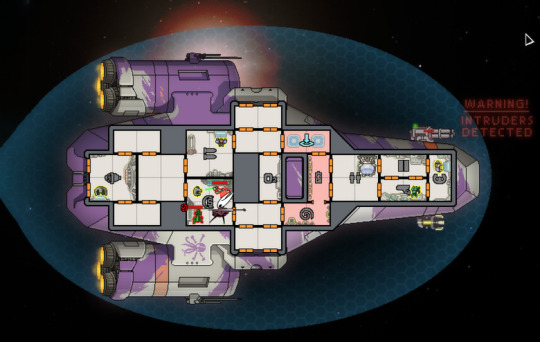
Hornet is in some shitty places until silksong comes out day 33
11 notes
·
View notes